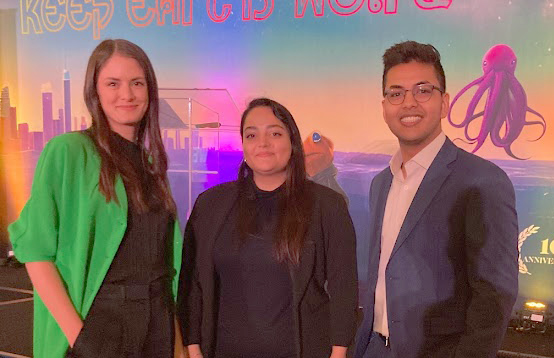As global energy demand evolves and increases, so does the need for cutting-edge solutions and technologies to help drive the industry forward.
Here at the College of Energy, five students have taken on this challenge head on. They have leveraged their aptitude for the latest market trends to develop promising technologies that address important and emerging clean energy sources.
University of Houston engineering doctoral students Erin Picton and Parisan Taheri, sophomore finance and accounting major Pranjal Sheth, finance graduate student Cameron Templeton and junior computer science major Anneka Gill were part of three teams that recently participated in the U.S. Department of Energy’s 2023 EnergyTech University Awards competition.
The EnergyTech UP competition aims to nurture the energy innovators of the future by encouraging multidisciplinary student teams to develop and present business plans for high-potential energy applications in a variety of sectors.
Each UH team competed in a first-stage Explore event, with regional winners advancing to a national pitch event and gaining access to DOE’s Technology Transition Office curriculum and mentorship. Additionally, eight bonus prize finalists were selected from each region, with the DOE Technology Office selecting one winning team from the technology area to award a $25,000 prize.
Recognizing the capabilities and economic value of hydrogen as a potential superior energy source of the future, Gill worked with two students from Prairie View A&M University to bring to market a ceramic membrane technology developed by Argonne National Laboratory to improve blue hydrogen production.
Their efforts earned them an OTT-specific National Lab Technology IP License Bonus Award. With this win, Gill’s team became the only bonus award winners to advance to the national competition along with the regional winners.
“My team and I quickly recognized the limitations of our current energy resources to support the energy needs of a growing population,” said Gill. “As ever-increasing energy consumption to maintain modern lifestyles continues to strain the planet, economical, sustainable, net-zero carbon energy solutions are more important than ever.”
She added that hydrogen could play a pivotal role in the transition from carbon-intensive practices to net-zero emissions by providing a clean, renewable and efficient energy source that can help meet our energy needs without continuing to harm the environment.
Picton, Taheri and Sheth formed Team LiQuidium, whose winning presentation in the Eastern Region focused on cutting-edge lithium-selective nanomembranes developed by students in the Schaffer lab at the University of Hawaii.
According to Picton, the LiQuidum team captain, the project can “contribute to reducing the barriers to electrification by creating a significant source of energy storage that is both environmentally and economically sustainable.” [that] It will help the United States remain a global leader in decarbonization.”
“We are addressing a critical supply chain gap in domestic lithium refining, extracting more lithium from our brine sources while generating less waste… [the] “Lithium-selective nanomembranes,” Picton said.
LiQuidium wasn’t the only regional winner: Templeton teamed up with students from the University of Texas to form the Pike Robotics team, which won the Southwest Regional Championship with a business plan centered around an autonomous robot that could inspect storage tanks.
Students interested in competing as students next year or supporting the team should follow HeroX’s EnergyTech UP page for updates and more information.

